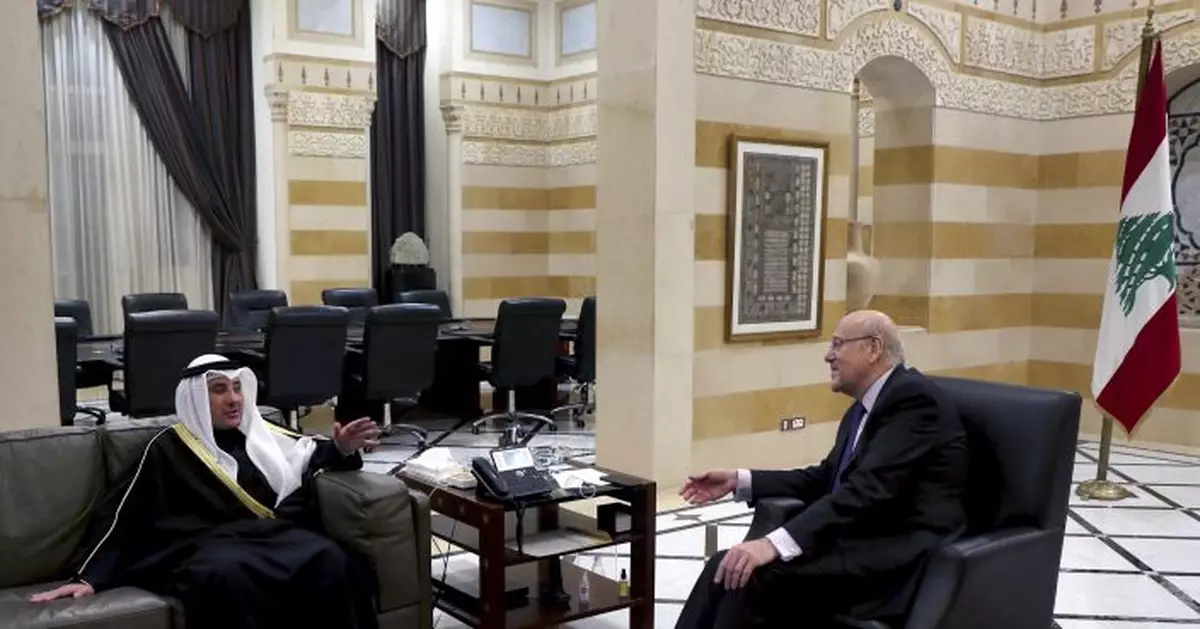Kuwait’s foreign minister handed Lebanese officials Saturday a list of suggestions for confidence-building measures with oil-rich Gulf states after relations between the two sides deteriorated dramatically over the past months.
The visit by Sheikh Ahmed Nasser Al-Mohammed Al-Sabah is the first by a senior Gulf official to Beirut since an unprecedented diplomatic row between Lebanon and Saudi Arabia and its neighbors broke out in October.
The crisis was triggered by remarks by Lebanese Information Minister George Kordahi in which he said in a televised interview that the war in Yemen was futile and called it an aggression by the Saudi-led coalition.
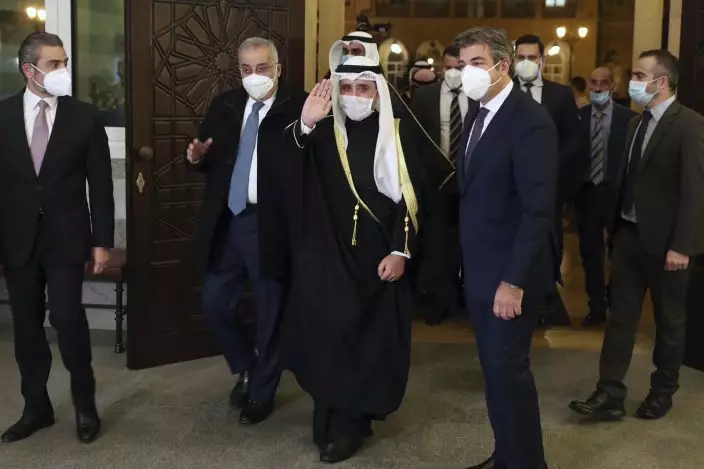
Kuwaiti Foreign Minister Sheikh Ahmad Nasser al-Mohammad al-Sabah, center, gestures as he arrives to meets with Lebanese Prime Minister Najib Mikati, in Beirut, Lebanon, Saturday, Jan. 22, 2022. (AP PhotoBilal Hussein)
Following Kordahi’s televised comments, the kingdom recalled its ambassador from Beirut and banned all Lebanese imports, affecting hundreds of businesses and cutting off hundreds of millions in foreign currency to Lebanon. Several Arab countries followed Saudi Arabia’s step.
Kordahi, who made his comments before taking his post, resigned in December, a move that did not lead to improved relations between the two sides.
But the crisis goes deeper than Kordahi’s comments aired in late October. It is rooted in Saudi Arabia’s uneasiness over the rising influence of Iran in the region, including in Lebanon, once a traditional Saudi ally and recipient of financial assistance from the oil-rich kingdom.
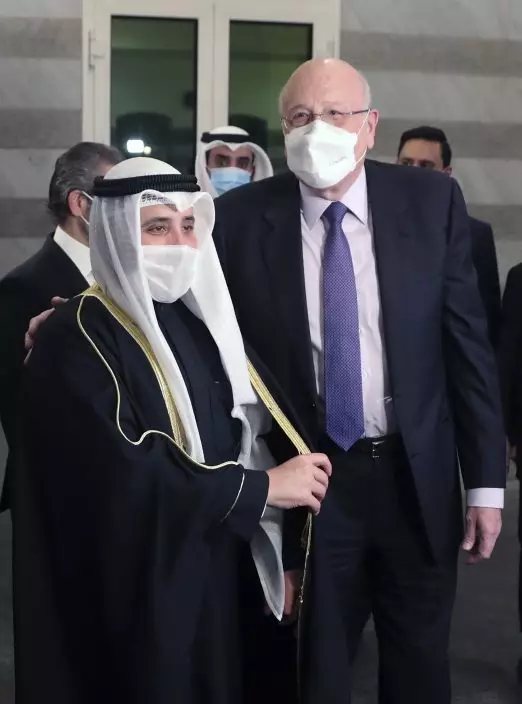
Lebanese Prime Minister Najib Mikati, right, receives with Kuwaiti Foreign Minister Sheikh Ahmad Nasser al-Mohammad al-Sabah in Beirut, Lebanon, Saturday, Jan. 22, 2022. (AP PhotoBilal Hussein)
Sheikh Ahmed told reporters after meeting Prime Minister Najib Mikati that his visit to Beirut is part of international efforts for confidence building measures “with brotherly Lebanon.”
He added that such steps for confidence building measures do not happen “overnight but they should be the result of tangible steps that are felt by all sides.” He added that based on that “things will move forward.”
The Kuwaiti official said he handed Mikati and his Lebanese counterpart Abdallah Bouhabib the demands and “now the brothers in Lebanon should study them and know how to deal with these matters and move ahead.” He refused to elaborate on what the demands are.
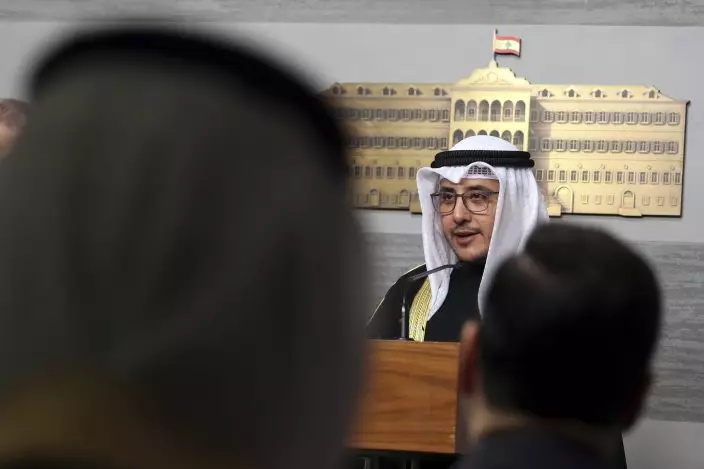
Kuwaiti Foreign Minister Sheikh Ahmad Nasser al-Mohammad al-Sabah, right, speaks during a joint press conference with his Lebanese counterpart Abdallah Bouhabib, in Beirut, Lebanon, Saturday, Jan. 22, 2022. (AP PhotoBilal Hussein)
In the weeks that followed Kordahi’s resignation, tensions between Hezbollah and Saudi Arabia continued to rise.
In late December, Saudi Arabia’s King Salman called on the Lebanese in a speech “to end the terrorist Hezbollah’s control” of Lebanon.
In early January the leader of the Iran-backed Hezbollah Hassan Nasrallah launched a verbal attack against the kingdom, accusing the Riyadh of spreading extremist Islamic ideology.
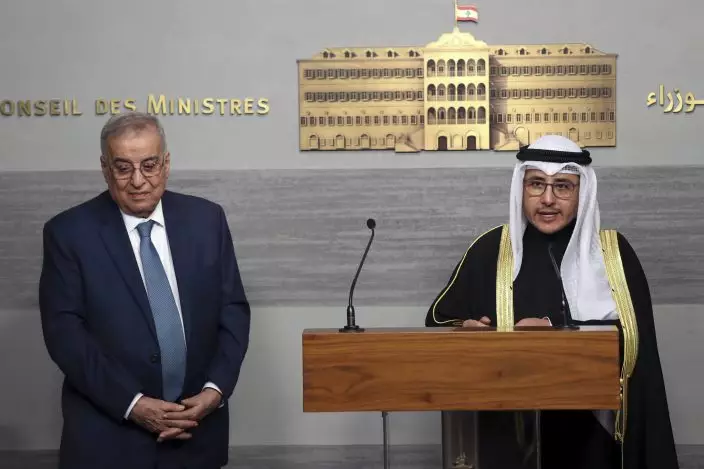
Kuwaiti Foreign Minister Sheikh Ahmad Nasser al-Mohammad al-Sabah, right, speaks during a joint press conference with his Lebanese counterpart Abdallah Bouhabib, in Beirut, Lebanon, Saturday, Jan. 22, 2022. (AP PhotoBilal Hussein)
Days later, several Saudi Shiite opposition figures held a conference in a Hezbollah stronghold in Beirut in which they criticized the kingdom.
Sheikh Ahmad said that in order for the initiative to be successful there should be no interference in the internal affairs of Arab countries in general, and specifically Gulf states. Lebanon should “not be used a launching pad for oral or active aggression against any country,” he added.
Mikati’s office said the prime minister told the Kuwaiti guest that Beirut wants excellent relations with all Gulf states.
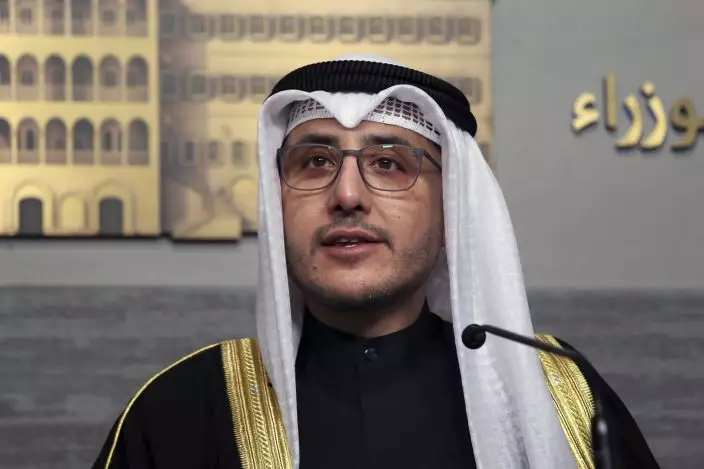
Kuwaiti Foreign Minister Sheikh Ahmad Nasser al-Mohammad al-Sabah, right, speaks during a joint press conference with his Lebanese counterpart Abdallah Bouhabib, in Beirut, Lebanon, Saturday, Jan. 22, 2022. (AP PhotoBilal Hussein)
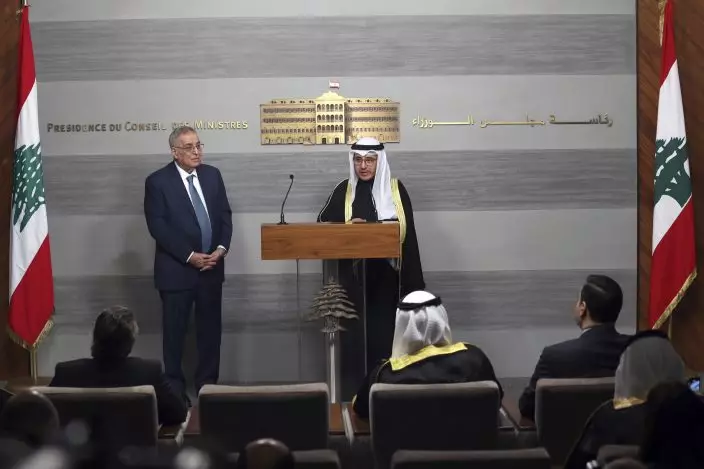
Kuwaiti Foreign Minister Sheikh Ahmad Nasser al-Mohammad al-Sabah, right, speaks during a joint press conference with his Lebanese counterpart Abdallah Bouhabib, in Beirut, Lebanon, Saturday, Jan. 22, 2022. (AP PhotoBilal Hussein)
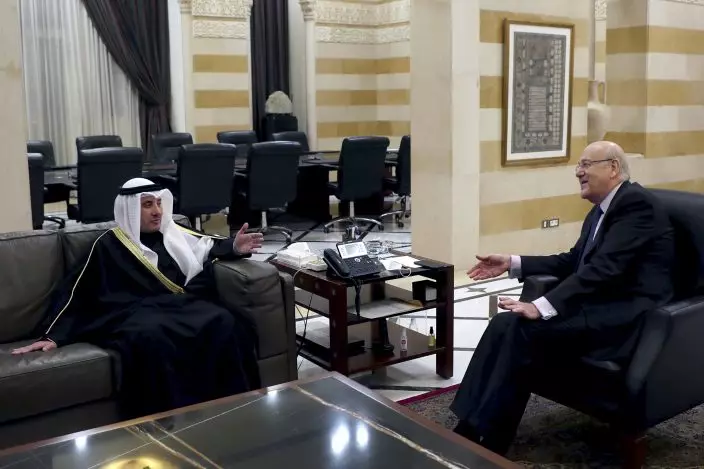
Lebanese Prime Minister Najib Mikati, right, meets with Kuwaiti Foreign Minister Sheikh Ahmad Nasser al-Mohammad al-Sabah in Beirut, Lebanon, Saturday, Jan. 22, 2022. Al-Sabah handed Lebanese officials Saturday a list of suggestions for confidence building measures with oil-rich gulf states after relations between the two sides deteriorated dramatically over the past months. (AP PhotoBilal Hussein)


